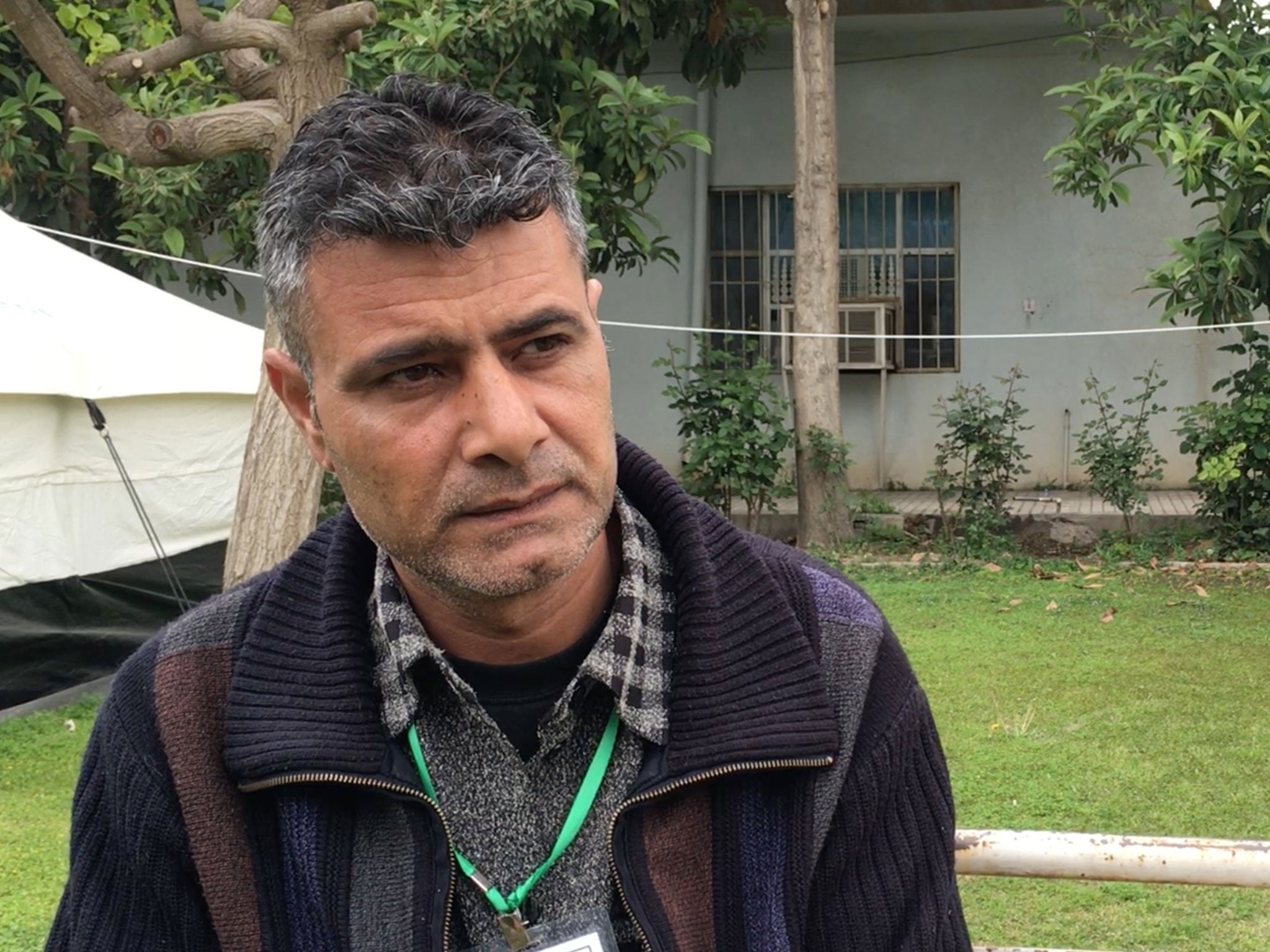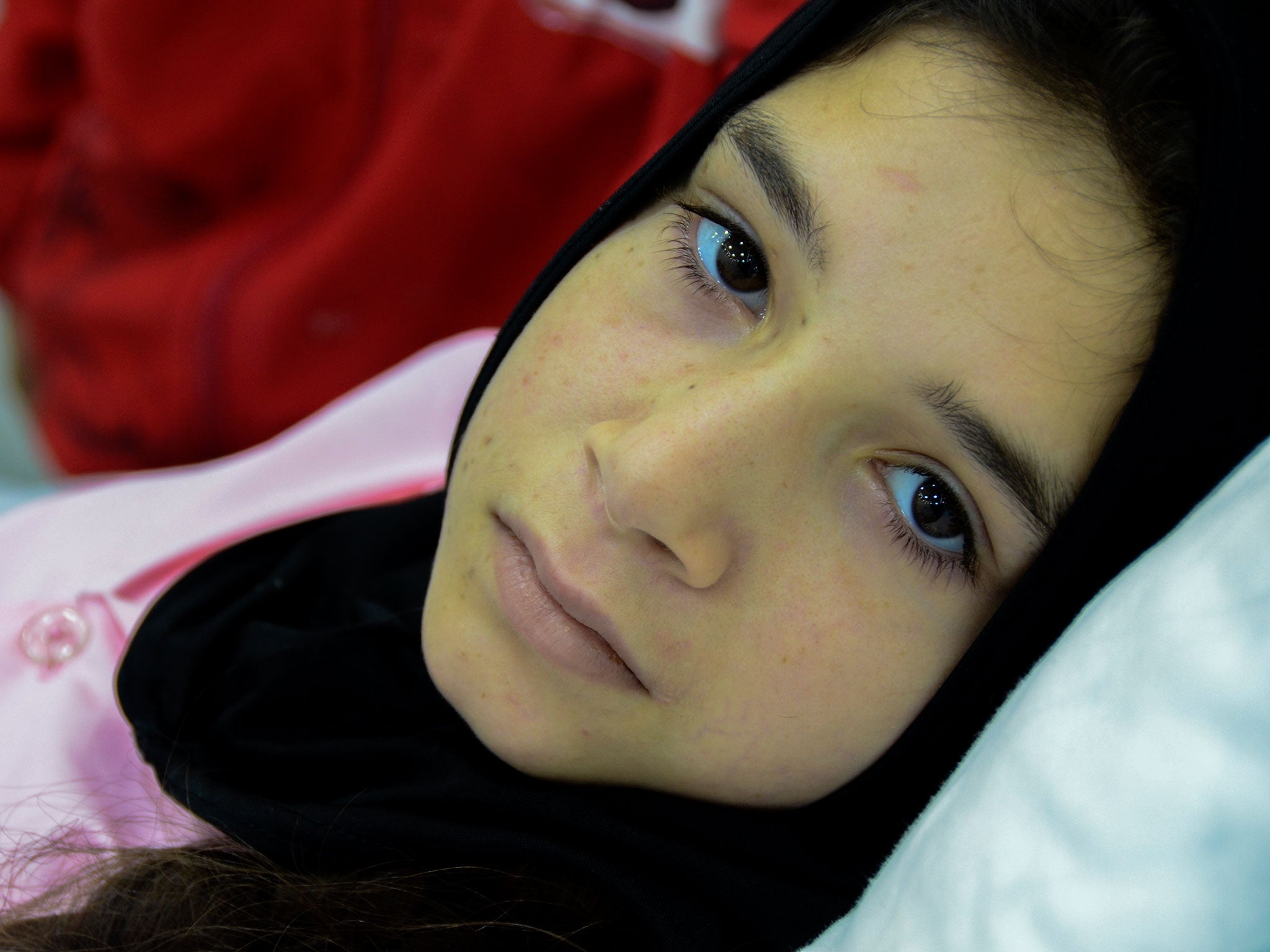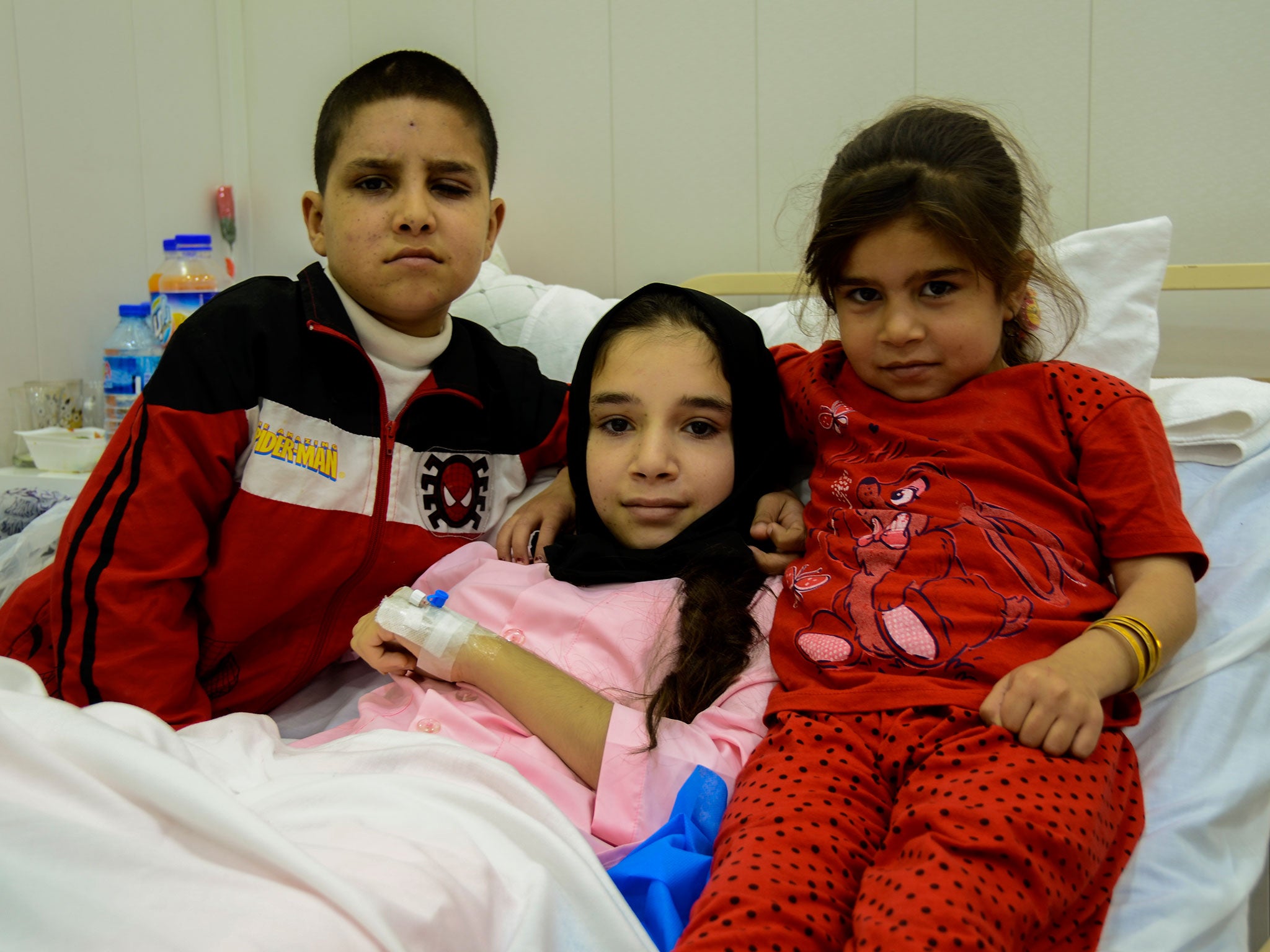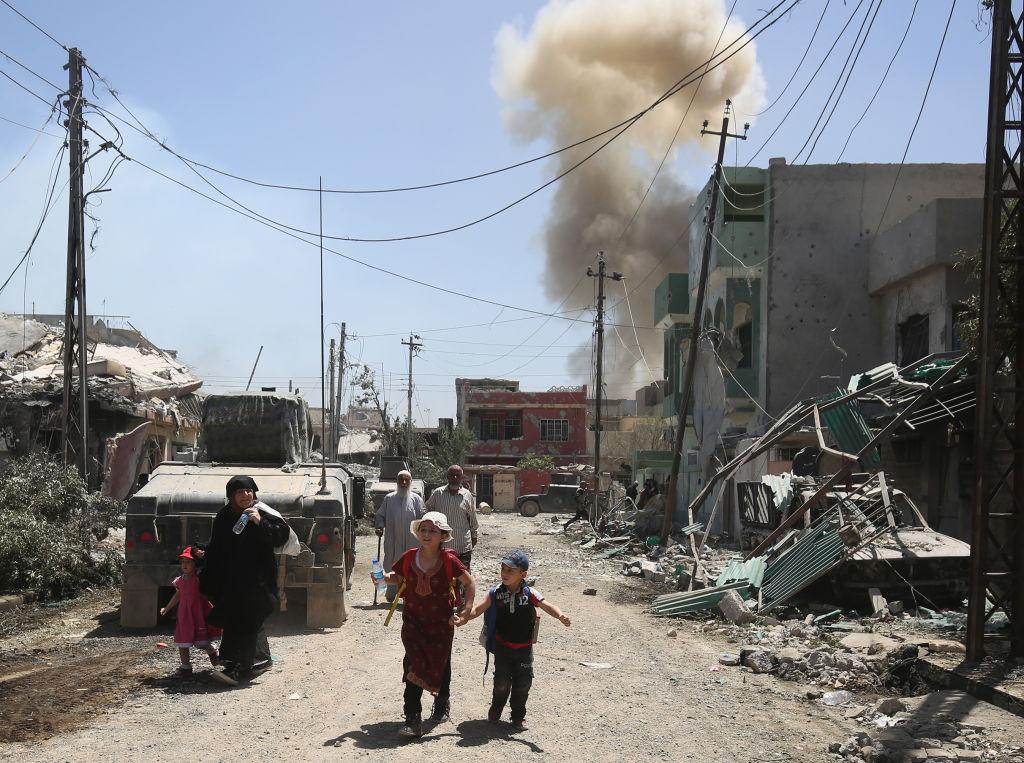'My family are in pieces in the street': Father who saw wife and son killed tells of horror attempting to flee Mosul
Exclusive: Abid and his family were caught in the crossfire between Isis and the Iraqi army
“I have lost my family, my family are pieces in the street, just take my children.”
Those were Abid’s first words to Iraqi soldiers as he fell across their frontline holding his injured son and daughter, having been shot five times as the family attempted to flee Mosul.
He survived the horrific ordeal but his wife and 11-year-old son died before his eyes as an Isis car bomb exploded in the street they were running down.
“When the air strikes and shooting started, I took shelter between the wall and the cars, and suddenly there was an explosion,” Abid recalls in an interview with Save the Children.
“A car bomb exploded next to my family, and I was a bit ahead of them, so the explosion pushed me forward.
“I looked behind and all I saw was fire and smoke, I passed out for few minutes, then I woke up to the screams of my children.
“I looked at my daughter, she was covered in blood, from head to toe, her clothes were torn off, my son was the same, it was horrifying.
“I looked back to discover my wife cut into two pieces, and my elder son’s belly was open, his intestines hanging out. My other daughter’s leg was burning and she was lying on the ground.”

Abid swept up his nine-year-old son, Bashir, and seven-year-old daughter, Yasmina, and started running but got caught in the crossfire between Iraqi forces and Isis.
With three bullet wounds to his legs and two in his back, he ran until he met the army, handing over his children for medical help.
“They came to me but I told them I was dead, so to just take my children,” Abid said.
“I was totally shocked and couldn’t understand what just happened, I thought I lost the rest of my family as I saw them lying on the ground drowning in their blood.
“Then they took us to the hospital, we spent maybe ten days there until I regained consciousness properly.”
The father woke to be told his wife and eldest son were dead, while his daughter had been found but had to have her leg amputated and nine-year-old Bashir was badly injured by shrapnel that hit his face and eyes.

Yasmina survived with minor injuries, as did his four-year-old son, Khaled.
The nightmare had started in 2014 when Isis took control of Mosul where Abid owned a small restaurant, using the city’s mosque to declare the formation of the “Islamic State”.
When life in the city became unbearable under a lack of jobs, food and the “constant pressure” exerted by Isis’ brutal interpretation of Sharia law, the family moved to a nearby village.
Life was also terrible as the family “waited for a miracle to happen”. When the offensive to retake Mosul started last year, they thought it had come.
But the relief was short-lived when Abid, his wife and their five young children were rounded up and forced back into Mosul to be used as human shields.
“It was the worst of war, intensive bombing and clashes day and night, the shells were falling like rain, and the air strikes were targeting everything, even the houses,” Abid says.
“It was crazy to try and leave your place because Isis fighters would shoot you if they saw you in the street and the airplanes would target anything that was moving.
“We were literally starving, so I decided that we must find our way out, otherwise I knew we would die here for sure.
“I couldn’t take it any longer – I took my family and started moving out…and I wish I hadn’t.”
Abid waited until he heard the army had advanced to just a few streets away, sneaking his family alongside others out of a house and through the ruined streets.
While attempting to avoid Isis’ notorious booby traps and mines, the families were showered with shrapnel from a nearby air strike. They ran for shelter but seconds later, the car bomb hit.
He, Bashir and Yasmina were evacuated by the Iraqi military to Erbil emergency hospital, later being reunited with Khaled and Amina.
Amina, 13, is now recovering and hopes to one day become a doctor like those who saved her life.
“I want to go back to school,” Amina told aid workers from her hospital bed. “War is bombing, people die in the street…people turn into pieces, this is war, missiles, bombs…this is what happened to us. The war must stop.”
The increasing intensity of civilian casualties in Mosul caused Iraqi forces to temporarily pause their advance earlier this year.

The Old City is densely populated – Save the Children says overcrowded residential areas are being hit by US-led coalition air strikes, artillery, rockets, mortars and makeshift explosives and that an estimated 90 per cent of those killed or injured in residential areas are civilians, with children being the most likely to die.
“Bombing densely populated civilian areas in Mosul and destroying its infrastructure will make it harder to rebuild the city and restore hope,” says Kevin Watkins, CEO of Save the Children, adding that Iraqi forces and their coalition allies should take “every precaution” to protect civilian lives.
According to the latest figures released by the Iraqi government, more than 400,000 people have been displaced from west Mosul in the past two months alone, bringing the total number of people displaced by the offensive to 700,000, including hundreds of thousands of children.
Many of those who survived are deeply traumatised by the conflict and Isis brutality after witnessing beheadings, shootings and crucifixions and being forced to undergo an extremist education or enter camps training child soldiers.
The Iraqi army initially urged civilians to stay inside their homes during battles, but leaflets dropped on Isis’ last remaining strongholds on Thursday urged them to flee using new exit corridors.
But charities are concerned the call to leave will see them caught in the crossfire, with significant doubts that any route will be “genuinely safe” for the 200,000 people still trapped in Mosul.
The warnings come as the UN says civilians are “increasingly paying the price” as air strikes on Isis escalate in neighbouring Syria and terrorists seek bloody retribution.

“We fear civilians are in an increasingly dangerous situation as the air strikes and ground conflict intensify, possibly resulting in many more casualties, as well as retaliatory assaults by Isis against densely populated civilian areas,” says the UN High Commissioner for Human Rights, Prince Zeid bin Ra’ad.
“There is little doubt that Isis continues constantly to kill and endanger civilians, committing war crimes without any compunction whatsoever.
“However, it is also far from clear that the fundamental principles of international law are being properly adhered to by all the various air forces engaged in the fight against Isis.”
There was news of more deaths on Friday, as at least 35 people were reportedly killed when bombing destroyed a market and a four-storey building in the Isis-held town of Mayadeen.
US Central Command has also confirmed the deaths of more than 100 civilians, including children, in an air strike on the al-Jadida district of Mosul in March.
They were sheltering in buildings targeted because of the presence of Isis snipers on the roof, bombed on the instruction of Iraqi forces who were apparently unaware of the families inside.
Investigators said a single guided bomb hit the top floor but “ignited a large amount of explosive material” placed inside by Isis fighters, destroying the building.
“Catastrophic” rates of civilian casualties caused the Mosul offensive to be temporarily paused following the incident, which has been contested by local residents claiming there were no additional explosives inside the building.
The bombing is the largest single instance of civilian deaths confirmed by the coalition in the nearly three-year-long campaign against Isis, and brought the total number of civilians confirmed killed by the Pentagon to 457.
Independent monitoring groups put the total number of civilian deaths as much higher, estimating that thousands have been killed in Iraq and Syria since 2014.
Join our commenting forum
Join thought-provoking conversations, follow other Independent readers and see their replies
Comments
Bookmark popover
Removed from bookmarks